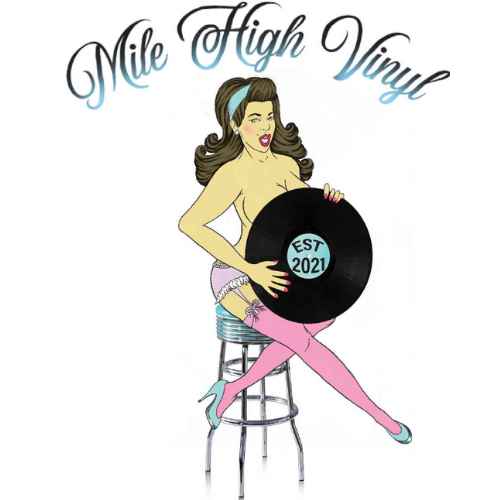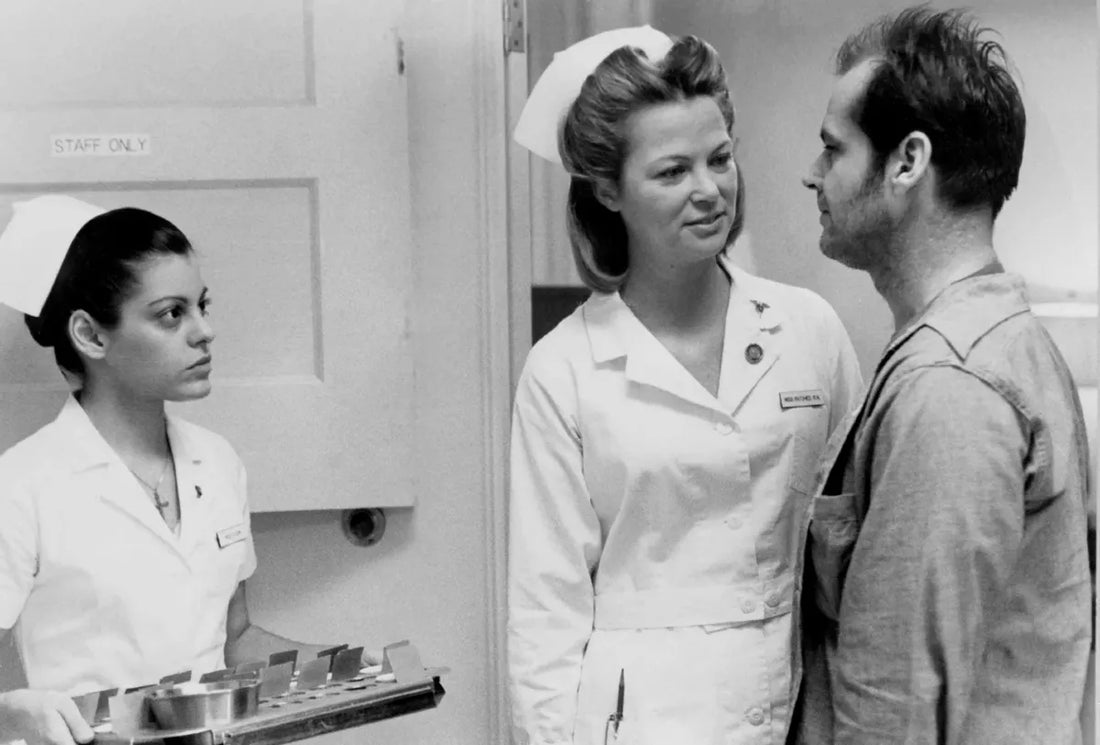
I had watched One Flew Over the Cuckoo's Nest for the first time when I was twelve or thirteen. I came across a VHS copy at the Salvation Army in Saskatoon, a store where my mother is still on a first name basis with everyone who works there, and possibly everyone who has ever shopped there. I had never heard of the film, but being that Jack Nicholson was on the cover, who is among my favorite actors, I decided to take a chance, put the VHS in the cart, and the film has since become what I would consider to be one of the greatest films since the birth of film itself.
Aside from Milos Forman’s mastery as director, which fully encapsulated Ken Kesey’s grim societal case study on the criminal justice system and the many abuses which transpired within psychiatric hospitals of the 1960’s (when the novel was initially based), an elemental aspect behind the film's success was the equally nuanced performances by both Jack Nicholson and Louise Fletcher.
In the film adaptation, released in 1975, Jack Nicholson played Randal McMurphy, the unlikely protagonist of the story who is committed to a state mental hospital after pretending to be insane to avoid serving out his sentence in prison for the statutory rape of a fifteen-year-old girl. I know, fucked up. Louise Fletcher played Mildred Ratched, the domineering and manipulative head nurse, who had full control of every patient within the mental hospital. Through Fletcher’s portrayal, she played the perfect antagonist which is still considered by many film critics to be one of the most memorable movie villains ever put to screen. Her performance was so powerful that she won an Oscar for Best Actress. For Nicholson’s masterful performance, he also walked away with his first Oscar for Best Actor, as the film itself went on to also win Best Picture, Best Director, and Best Adapted Screenplay, a monumental feat.
In the years that followed, Jack Nicholson continued his winning streak as an actor, winning two additional Oscars for performances in Terms of Endearment and As Good as It Gets, both produced and directed by The Simpsons producer James L. Brooks, while cementing himself as one of the greatest actors of all time until his eventual retirement. Louise Fletcher on the other hand failed to propel herself into the realm of superstardom, which her performance in One Flew Over the Cuckoo’s Nest initially implied as being a certainty.
Now this isn’t to say that Louise didn’t continue to work as an actor, as she did with dozens of proceeding film roles, but rather that her roles from that point forward were never as memorable as her work as Nurse Ratched. I don’t think this was any fault of her own, but rather something I call The Typecast Curse. This is a phenomenon which occurs when an actor is so memorable in a single film or television role that the audience has difficulty separating the actor from that subsequent role. There are dozens of examples of this which could be debated, and which many of you may disagree with me on. Just realize that I’m not putting down any actor’s or actresses' abilities, but rather drawing to performances or theirs which were so phenomenal that many viewers may have difficulty seeing them as anyone other than the character they portrayed within their titular role. For the sake of this blog, I will limit the number of actors mentioned who have also suffered from The Typecast Curse to only three.
Daniel Radcliffe:

When you think of Daniel Radcliffe, what’s the first movie to come to mind? Yes, that’s right, The Lost City. I’m only joking. I know I’m not the only person who couldn’t make it past the first twenty minutes. Undoubtedly, the first movie to come to mind, or rather series of movies to come to mind, would be Harry Potter, which spanned a total of eight films.
Daniel Radcliffe’s performance in the film series was so spot on that he not only encapsulated the very essence of Harry Potter through his performance, but even had an uncanny resemblance to the cartoon illustration on the cover of Harry Potter and the Philosopher’s Stone, written by the magnificently talented J.K. Rowling, which was published in 1997; four years before the film adaptation with Radcliffe was released.
Since his Harry Potter days, Radcliffe has starred and co-starred in nearly twenty films, as well as roles in multiple television shows. In his most recent film role, Radcliffe even played “Weird Al” Yankovic. However, for those like myself, no matter what role Daniel Radcliffe may decide to take on in the future, Harry Potter will be the first thing to spring to mind, which indicates how perfect he was to play the boy wizard.
Jerry Seinfeld:

Seinfeld was one of the biggest shows of the late eighties and nineties, and the show’s monumental success ensured that the series creator never had to work another day in his life. The show having amassed a near billion-dollar fortune for Jerry Seinfeld in the years since the show ended its nine-season run through syndication, royalties, DVD sales and streaming deals.
With this said, when you think of Jerry Seinfeld, are there even three additional roles that you can name off the top of your head other than Seinfeld, or a role where he’s not playing himself? I can personally think of just a single role, which was rather a voice-over role, where Jerry spoke the words of the bee in The Bee Movie. I say the bee since I can’t personally remember the name of the bee... I have a feeling his name started with the letter “B” since Seinfeld also wrote the movie and would likely want to remain clever and witty for viewers.
The show Seinfeld itself will likely always be remembered as one of the funniest to grace television screens across the world, despite the main character being arguably the most dry and boring part of the show. That isn’t to say that Seinfeld was a bad show, but rather that Jerry Seinfeld created such a colorful and humorous cast of characters where Seinfeld himself was consistently overshadowed. I mean, when you think of a humorous scene or moment from the show, Kramer, George or Newman would likely come to mind, with Elaine being the eye candy of the series. Viewers tuned in to watch the supporting cast, as well as laugh at Michael Richard's outlandish mannerisms and sporadic entrances, which lived on past the series finale until the guy completely obliterated his career by going on a drawn-out racist tirade during a comedy performance at The Laugh Factory in 2006.
If Jerry Seinfeld wasn’t the series creator, along with Larry David, I have my doubts that he would have landed the main role of the series, or had the show named after him in the first place. I’m not trying to be an asshole or anything, I’m just saying... you know... that you remember Jerry Seinfeld for having created a truly great television show rather than being a memorable part of the show itself. His writing talent is off the hook, though, and the guy likely has enough money to buy the entire province I live in, so with that said, let's move on.
Ralph Macchio:

The Netflix series Cobra Kai has caused a resurgence of nostalgia culture, where popular films and TV shows of the past have gotten updated releases with original cast members reprising their famous roles. If you were born in the 1980’s, which I was not, then you may also remember The Karate Kid, which starred an awkward twenty-something year old actor, Ralph Macchio, who played seventeen-year-old Daniel LaRusso (believably so because the dude looked like he was fourteen).
In 2018, Ralph Macchio reprised his role as a much older version of Daniel LaRusso, who he was born to play. Although the show has some of the corniest dialogue to come between a fat man like me and cake, (in the shows defense, the show did originally air on Youtube Premium of all places) it has quickly become one of Netflix best original series after the mammoth streaming service acquired the rights to the series in June of 2020. Without Ralph “The Karate Kid” Macchio reprising his role, I doubt the series would have become as popular as it has.
In the years since The Karate Kid initially hit movie theatres nearly forty years ago, Ralph Macchio has had a bit of acting success. Having co-starred as the cousin to Vinny in My Cousin Vinny, which also co-starred hot tamale Marissa Tomei and the ill-tempered, Joe Pesci. Macchio also had a two-minute role as screenwriter Joe Stefano in the 2012 biopic, Hitchcock (which wasn’t really a biopic of Alfred Hitchcock at all). He also had roles in a slew of straight to DVD movies which I cannot name off the top of my head since I didn’t watch them and have no intention to. He was also on the relentlessly horrible Dancing with the Stars, which is notoriously known as being the place washed-up actors and performers go to admit that their careers have officially died.
However, Macchio returned to the role that made him a household name for a few years during the eighties, only to have been forgotten about for roughly three decades, and re-emerge to play the role that he was always meant to play. Decades from now, when the sentiment of Cobra Kai has come and gone, two old guys in a retirement plaza will talk about the good old days as they sit around wearing virtual reality headsets within the metaverse as they look to younger versions of themselves in front of a serene, artificial pond. For a second, one of the old men will look to his friend and ask;
“Hey William?”
“Yeah?”
“You remember that show from years back which had a karate kid?”
“Nope.”
“Yeah, neither do I.”
Then William will fart and they will never talk about the show or the movie the show was based on ever again. For the time being, we can all rest easy knowing that our thirst for nostalgia has given a handful of forgotten actors a broadened purpose and employment through the Netflix series, Cobra Kai.
In closing, Lousie Fletcher gave a truly incredible performance as Nurse Ratched, which helped pave the way for the horrible and instantly forgettable Netflix series, Ratched, to air nearly half a century later. Although that show was awful, and not worth watching at all, Louise Fletcher’s masterwork as the bitter, manipulative and controlling head nurse within the monumental One Flew Over the Cuckoo’s Nest will be viewed, studied and enjoyed by film lovers for centuries to come.
The unfortunate aspect of the height within the performance which won her an Oscar and cemented one of the greatest film rivalries and power struggles between herself and McMurphy was how, with a role as phenomenal as Nurse Ratched, that there is a likelihood that some of her other work may be forgotten to time or overshadowed completely. But with this said, not all actors are even lucky enough to get that one role which cements them as one of the greats. And as for Louise Fletcher, she did get that once-in-a-lifetime role, made it completely her own, lived a good life, and actually did something that she loved doing which was being an actress. In my opinion, that is something to be incredibly proud of.
Whether or not she could be considered to have been a victim of The Typecast Curse, in Fletcher’s case, it may have been more of a blessing. For it will ensure that she is remembered through her greatest performance for generations to come. Rest in peace, Louise Fletcher. Your mark on cinema will never be forgotten.















